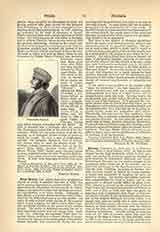

Filicaja, VINCENZO DA, lyric poet; b. at Florence, December 30, 1642; d. there September 24, 1707. At Pisa he was trained for the legal profession, which he later pursued, but during his academic career he devoted no little attention to philosophy, literature, and music. Returning to Florence, he was made a member of the Accademia della Crusca and of the Arcadia, and enjoyed the patronage of the illustrious convert to the Catholic faith, Christina, ex-Queen of Sweden, who with her purse helped to lighten his family burdens. A lawyer and magistrate of integrity, he never attained to wealth. His probity and ability, however, were acknowledged by those in power, and he was appointed to several public offices of great trust. Thus, already a senator by the nomination of Grand Duke Cosmo III, he was chosen governor of Volterra in 1696, and of Pisa in 1700, and then was given the important post of Segretario delle Tratte at Florence. An ardent Catholic, he not infrequently gives expression to his religious feeling in his lyrics, which, even though they may not entitle him to rank among the greatest of Italian poets, will always attract attention because of their relative freedom from the literary vices of the time, the bombast, the exaggerations and obscurity of Marinism. Notable among his compositions are the odes or canzoni, which deal with the raising of the siege of Vienna by John Sobieski, when in 1683 it was beleaguered by the Turks, and the sonnets in which he bewails the woes of Italy whose beauty had made her the object of foreign cupidity and whose sons were incapable of fighting for her and could only enlist mercenaries to defend her. The most famous of the sonnets is perhaps the “Italia, Italia, O to cui feo la sorte”, which Byron rendered with skill in the fourth canto of Childe Harold. Some letters, elogi, orazioni, and Latin carmina, constitute the rest of his literary output. After the death of Filicaja, an edition of the “Poesie toscane”, containing the lyrics, was given to the world by his son (Florence, 1707); a better edition is that of Florence, 1823; selected poems are given in “Lirici del secolo XVII”, published by Sonzogno.

